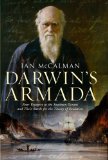Summary | Excerpt | Reviews | Beyond the Book | Readalikes | Genres & Themes | Author Bio

Critics' Opinion:
Readers' Opinion:
First Published:
Aug 2009, 432 pages
Paperback:
Nov 2010, 432 pages
 Book Reviewed by:
Book Reviewed by:
Kim Kovacs
Buy This Book
John Lewis, the Downe village carpenter and joiner, used his father's tools to make Darwin's coffin. Years earlier, Lewis's father had helped renovate Charles and Emma's shabby country house. John Lewis had established an oddly intimate relationship with the famous naturalist at the age of fourteen, when he was hired to slosh buckets of ice-cold water over Darwin's shivering frame as part of a modish water cure for the bowel problems that had made him a semi-invalid. Like so many of the villagers, Lewis respected Darwin as an eccentric but generous supporter of the local poor. They shook their heads when telling stories of seeing him stare for hours at an ant's nest. He would gravely thank the local children who rushed to open the gate for him as he took his afternoon walk. Lewis had also made the coops for Darwin's beloved pigeons, which seemed to occupy more of his time even than ants and barnacles. And it was probably the young carpenter who also built the special 'invalid chair' that Darwin was compelled to use in his last months to get up the stairs to his bedroom.
The coffin was built with strong planks of local oak. 'I made his coffin just the way he would have wanted it,' John Lewis later recalled, 'all rough, just as it left the bench, no polish, no nothin.' He loaded it onto his cart and trundled up to the house, where he helped the family to lay Darwin out in the local way. The dead man looked lifelike and serene, a sight so poignant that it set his three grown-up sons, William, George and Francis, sobbing. Their grief in turn breached their mother's crust of control. Emma, at seventy-four, had known her first cousin Charles Darwin all her life, and she had spent forty years of their marriage nursing his ailments, worrying about his godlessness and protecting his work habits. Tough as she was, she sat down beside his coffin and cried.
As Darwin's great biographer Janet Browne observes, dying is often our most political act. It was so with Darwin, and none knew this better than Thomas Huxley, the most political and combative of Darwin's disciples. Huxley thought it appropriate to the historical stature of his friend, as well as essential for the cause of professional science, that he be buried at Westminster Abbey. It was the memorial site of Britain's greatest achievers: '50 or a 100 years hence it would seem absolutely incredible to people,' Huxley argued, 'that the state had in no way recognized his transcendent services to Science'. Under his coaching, the Standard newspaper went further still; it implied that the Darwin family had a patriotic duty to accede to the people's wishes. 'We owe it to posterity to place his remains in Westminster Abbey, among the illustrious dead,' the editor thundered.
This was only one of a barrage of tactical moves that Huxley devised in order to engineer an appropriately grand funeral. Joseph Hooker, his usual helpmate in such matters, was unfortunately 'utterly unhinged' by Darwin's death. And despite his own magisterial scientific stature, Huxley faced some formidable obstacles, not least being to persuade some of Britain's most senior Church of England clergy to bury a professed religious sceptic in the Abbey. Whatever their own private ideas on evolution and many clergy had found ways to reconcile it with a divine creator they could not appear to be encouraging freethinkers and atheists. But Britain's most eminent scientific writer and educator had not acquired his newspaper nickname of 'Pope Huxley' for nothing. He was as wily as a pontiff. He induced a clergyman friend, Reverend Frederick Farrar, the Canon of Westminster and an amateur naturalist of liberal views, to put the case for a Westminster burial to the Dean of the Abbey.
Then there was the reluctant family, who were anxious to carry out Darwin's wishes and did not want to be thought vainglorious. Sir John Lubbock was recruited to persuade them. He wrote to William Darwin admitting that privately he too would have preferred to see Darwin buried 'in our quiet little churchyard where someday I would have joined him', but he emphasised that 'from a national point of view it is clearly right that your father should be buried in the Abbey'. Emma was adamant that Darwin's funeral not be spoilt by the religious controversy that had dominated the press following the publication of The Origin of Species in 1859. Sir William Spottiswoode assured her there'd be none, and once her eldest son decided in favour of Huxley's proposal, Emma acceded readily enough.
Reprinted from Darwin's Armada: Four Voyages and the Battle for the Theory of Evolution by Iain McCalum copyright (c) 2009 by Iain McCalum. with permission of the publisher, W.W. Norton & Company, Inc.





The Funeral Cryer by Wenyan Lu
Debut novelist Wenyan Lu brings us this witty yet profound story about one woman's midlife reawakening in contemporary rural China.
Your guide toexceptional books
BookBrowse seeks out and recommends the best in contemporary fiction and nonfiction—books that not only engage and entertain but also deepen our understanding of ourselves and the world around us.